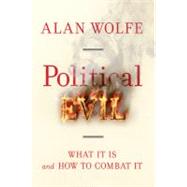
Note: Supplemental materials are not guaranteed with Rental or Used book purchases.
Purchase Benefits
What is included with this book?
| Introduction | |
| The Fundamental Question of the Twenty-first Century | p. 3 |
| What it is | |
| The Distinctiveness of Political Evil | p. 21 |
| Widespread Evil Within | p. 48 |
| Unrelenting Evil Without | p. 81 |
| The Misuses of Appeasement | p. 113 |
| How To Combat it | |
| Democracy's Terrorism Problem | p. 145 |
| The Case Against Dramatizing Genocide | p. 177 |
| Ethnic Cleansing's Seductive Attractions | p. 212 |
| The Politics of Counterevil | p. 246 |
| conclusion: Getting Serious (Once Again) About Political Evil | p. 282 |
| Acknowledgments | p. 303 |
| Notes | p. 305 |
| Index | p. 325 |
| Table of Contents provided by Ingram. All Rights Reserved. |
The New copy of this book will include any supplemental materials advertised. Please check the title of the book to determine if it should include any access cards, study guides, lab manuals, CDs, etc.
The Used, Rental and eBook copies of this book are not guaranteed to include any supplemental materials. Typically, only the book itself is included. This is true even if the title states it includes any access cards, study guides, lab manuals, CDs, etc.